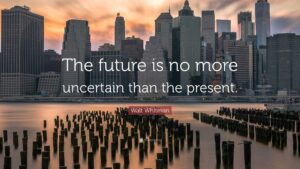
Think Different: Yesterday, I spoke to a group of human resources professionals on the future of work. One of the things I said was that in a rapidly changing world, it is essential to consider hiring individuals who will challenge conventional wisdom. To this end, this designer creates amazing things from everyday materials. At the end of the piece, he says his job is to “spend time considering the radical and the irreverent.” Spending time on such frivolous things may sound like a waste of time and money but these novel ideas may lead to some amazing breakthroughs such as clothes that change their design based on changes in the weather. (HR professionals, you may also enjoy this super, short article: Hiring for Stuck.)
Think Cheaper: In a separate presentation yesterday, I delivered a keynote entitled “Vuja De: A Futurist Takes a Backwards Stroll into the World of Tomorrow.” The gist of the presentation is that I use historical examples of change to highlight and better understand how the world of tomorrow may unfold. One of the unexpected things about the future is that products sometimes become less expensive. To this point, knee replacement surgery today costs $40,000 (without insurance). In the future, it could be less than $200 as this article explains. Another item that will likely grow less expensive are hearing aids. The latest Apple AirPods ($249) are already working as well as more expensive hearing aids for some (but not all) customers.
Think Smaller: Due to our rapidly changing climate, farmers may soon be planting more “short corn.” Today, only 30,000 acres are growing the new type of corn–which was developed by Bayer–but this could change quickly. This is something some farmers may want to start thinking about today.
Think Longer-Term: As a futurist, one of the many lessons I have had to learn the hard way is that often some of the most brilliant innovators are not wrong, they are just early. Sometimes, it takes time for the world to catch on their vision, plan, product or technology. If you work in the utility industry, I encourage you to read this piece on why one developer is not giving up on connecting the US’s electrical grids.
Think: Understanding the future can be complicated. One reason is because of the interconnectedness of the world. To wit, because of society’s growing demand for artificial intelligence (which consumes a lot of energy), Microsoft has recently purchased the old “Three Mile Island” nuclear power plant in Pennsylvania and is bringing it back online. In the long term, I wouldn’t be surprised if many of the world’s largest AI companies aren’t also the biggest funders and developers of nuclear fusion power.
Afterthought: “The greatest danger in times of turbulence is not the turbulence; it is to act with yesterday’s logic.” – Peter Drucker
